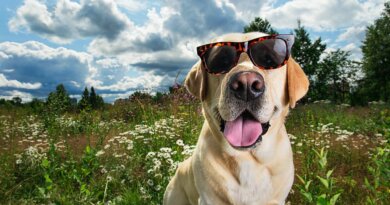How to Fix Your Dog’s Noise Phobia and Fear of Loud Noises
Caring for a dog that is afraid of thunder, fireworks or other loud noises can leave you feeling helpless. The level of noise anxiety is just as varied as the symptoms your dog may exhibit, but there’s a way to help your dog deal with noises of any kind.
If your dog’s fear of loud noises is not extreme, noise anxiety may only cause shaking or clingy behavior. However, if your dog falls on the extreme end of the spectrum, loud noises like thunder and fireworks may cause high levels of stress, destructive chewing, defecating indoors, panicked running, or even jumping through a window.
Noise anxiety in dogs is a common problem that makes pets uncomfortable, and in rare cases may be the gateway to other health issues related to anxiety. But don’t despair, there are ways you can help relieve your dog’s noise phobia.
Dog’s Fear of Loud Noises

Anxiety can be defined as a continuous fear about something that is not clearly present. Noise phobia in dogs can be an extreme, persistent fear of auditory stimuli that is out of proportion to the real danger, if any, associated with the noise. In this article, we’ll use anxiety and phobia interchangeably as the tips can be applied to both situations.
Get to the Bottom of It
It might be close to impossible for owners to determine what originally caused your dog’s fear of noises. The trauma could be the result of being too close to a lightning strike or loud fireworks earlier, but the reason is rarely obvious.
Some recent studies found that dogs can have genetic predisposition to noise anxiety. For example, if you own breed such as Collie, Golden Retriever or German Shepherd, you may experience a higher incidence of canine noise anxiety than owners of other breeds.
The same goes for dog’s family tree. If your dog’s parents had a noise phobia, it’s very likely that your pet will respond similarly.
Age also matters and it’s been observed how some dogs develop a noise phobia when they get older; however, for others it’s been a life-long stressor since they were puppies.
It is normal to expect some reaction from a dog when they hear loud noises. Even dogs who don’t have a noise phobia may show fear, as do humans. This natural instinct enables animals to respond to a situation that could potentially be harmful.
Noise phobia becomes a problem when your dog generalizes their fear and every sudden or loud noise in the environment becomes a “clap of thunder.” This means a dog’s fear of noises is pathological and is classified as “noise phobia.” Fortunately, this can be fixed or managed.
Signs of Dog’s Noise Phobia
When left untreated, noise phobia and anxiety in dogs is likely to get worse, leading to more serious problems. Complex molecular changes are involved in the development of a phobia in the dog. It isn’t that well understood, but it is clear that it affects how the dog processes information.
Oftentimes, pet owners do not even realize that a specific noise is scaring their pet. For example, if your dog reacts negatively to you taking a photo of him with a flash, it could be that he is afraid of the sound flash makes.
Here is some behavior to look out for in dogs with noise phobia (source):
- your dog freezes and withdraws to a place he considers safe;
- uncontrollable shaking/trembling;
- whining;
- panting;
- hyperventilating;
- ears flat and pulled back;
- destructive chewing;
- defecating indoors;
- runs around in a panic;
- your dog never wants to leave your side;
- starts disregarding all house rules, like jumping on furniture;
- goes through windows or squeezes into tight places to escape the noise.
Some reactions to the noise may not sound extreme but even the slightest negative reaction indicates a dog suffering from the fear of loud noises or noise phobia, and there may be damage to the dog’s nerve cells.
How to Help a Dog with Noise Aversion
First, as you prepare for Spring’s thunder or July 4th fireworks, try to act normal. Even when the loud noises start, and as you attempt to help your anxious dog, try to behave as if things are fine – dogs sense emotions from their owners, and often adopt them.
When it comes to treatment of noise anxiety in dogs, a single treatment may not always work. It is not unusual to use a combination of several anxiety aids to help a fearful dog before, during and after the stressful event. Below are some of the best ways to help a dog with a fear of loud noises.
(1) Safe Spot – If you see a thunderstorm approaching or know that an event with fireworks is happening soon, prepare an area for your dog where you know he feels safe and secure. For example, you can have a dedicated room with no windows and better noise isolation, or put him in a covered crate (only if he’s crate trained). The goal is to minimize exposure to sounds.
(2) Calming Sounds – Countering “scary sounds” with something more pleasant is very effective. For example, white noise machines were shown to help provide relief to anxious dogs. Alternatively, you can play calming music for the dog (classical works best) which you can find on YouTube or TV. If your dog’s anxiety is not too bad, this may disguise the noises your dog finds scary and distract him.
(3) Tire Out Your Dog – A tired dog is generally a calmer dog, and that applies to dog noise phobias too. It’s too late to encourage exercise during the event, but if you expect fireworks to take place, go out for a long walk, extra exercise and playtime, and get your pup as tired as he can be.
(4) Home Environment – Look into environmental modifications that are available to you in your home, such as using a noise bathroom fan (which your dog is likely used to) to mask the sound of thunderstorm or fireworks. To counter visual stimuli like exploding fireworks, get the dog to where he cannot see them or use blackout blinds. For dogs that have been trained, a ThunderCap can also help with this.
(5) Distract Your Dog – This rarely works but sometimes it may: see if your dog’s love for fetch, tug-of-war or other games will outweigh his fear of loud noises. If you notice that he can’t focus and looks worried, stop and do not continue. It’s worth a quick try, but you also do not want your pet to associate fun things with things that scare him.
(6) Interactive Toys – While treats and food will rarely work for fearful dogs during the event because fear shuts down appetite, interactive toys can sometimes be effective in mild cases. Regular toys can be used for dogs who are attempting to exhibit destructive chewing as a result of anxiety, but interactive and puzzle toys may actually distract your dog from what’s happening outside.
(7) Squeeze Your Dog – Offering comfort in the form of gentle but continuous pressure application on your dog may calm him because it affects certain pressure points and releases hormones that make the dog feel safer. You don’t want to reward your dog’s loud noise anxiety with this move so ensure it doesn’t resemble your normal petting behavior; this should be specifically a “comforting” move. If successful, you should see and feel your dog’s muscles relax.
(8) Anxiety Vests – Similar to squeezing your dog, anxiety vests like ThunderShirt apply pressure that makes the dog feel secure. Keep in mind that dog anxiety vests or any other pressure wrap show results at first use but some dogs might have to wear it two, three times before you see a reduction in loud noise fear symptoms.
(9) Doggles – There are specific types of goggles for dogs. Similar to ThunderCap mask, dog goggles will diffuse or even block the light from fireworks and thunder. It may help some dogs relax and feel less anxiety. Do not attempt to use these on your dog for the first time during an event that causes anxiety as it’ll worsen the situation. Getting your dog used to dog goggles should be done when he is calm and relaxed.
(10) Calming Collars – Anxious dogs can be calmed down using pheromones, and calming collars, also known as D.A.P. collars, release dog appeasing pheromones that will have a calming effect on your dog. It’s one of the very few dog anxiety treatments that have been scientifically proven to work.
(11) Mutt Muffs – This is a type of hearing protection for dogs, similar to ear buds for us. It will lessen the intensity of sounds. Same as with dog goggles, you should not use dog ear muffs the very first time when there are already loud noises abound; you need to give your dog time to adjust to them when there’s nothing to cause anxiety in your pet.
(12) Anxiety Medications – There are some dog anxiety medications that you can give your dog during fireworks or thunder that are prescribed by a vet, and they work similar like those for people. Other over-the-counter treatments that are popular include Adaptil diffuser, Composure treats, and Zylkene. These should be as one of the last resorts after you’ve tried all natural solutions.
Finally, Try Behavioral Work
If none of the above works, it is time for you to consider behavior desensitization, counter-conditioning or a combination of both. These are techniques used to help your dog get over their noise anxiety, and as effective as they are, they will take a good amount of training and will not be quick-fixes.
Desensitization is the slow exposure of your dog to sounds he overreacts to. You can buy CDs with noises (like thunderstorm) that your dog find scary and play it at a low level. As he gets used to it, you increase the sound level.
Over time your dog will be able to tolerate a real thunderstorm or a firework show. Counter conditioning works better on dogs whose noise phobia has been with them for a long time. It involves rewarding your dog with a treat when he does not overreact to loud noises.
At the very end of it all, if nothing still works, it’s time to discuss your dog’s fear or loud noises, his noise phobia and noise anxiety issues with a canine expert. Talk about this with your veterinarian and a canine behaviorist. A vet will be able to prescribe a good anxiety medication for this, and a dog trainer will teach you some effective tricks to deal with this problem. Just don’t leave your dog’s fear of loud noises unattended.
READ NEXT: 7 Proven Ways to Calm Down A Dog (Backed by Science)





